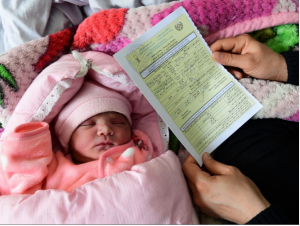ForumIAS announcing GS Foundation Program for UPSC CSE 2025-26 from 19 April. Click Here for more information.
Source-This post on New rules for childbirth registration is based on the article “Centre to separately record parents’ religion during registration of childbirth” published in “The Hindu” on 5th April 2024.
Why in the News?
The Ministry of Home Affairs has drafted model rules for childbirth registration. These rules must be adopted and notified by state governments before implementation.
What is proposed in the new rules for childbirth registration?

Specify the religion of both parents separately:
a. When registering a child’s birth, parents will now need to specify the religion of both the father and mother separately.
b. Previously, birth registers only noted the family’s religion.
c. The new “Form No.1-Birth Report” will include separate sections for the child’s religion, as well as the religion of both the father and mother.
d. This update also applies to parents of adopted children.
According to the Registration of Births and Deaths (Amendment) Act of 2023, information on birth and death registrations will be maintained in the national database.
What is Registration of Births and Deaths (Amendment) Act, 2023?
This act amended the Registration of Birth and Death (RBD) Act,1969. According to Registration of Birth and Death (RBD) Act,1969 a birth or death must be registered within 21 days. If not registered within this period, it can be registered under the RBD Act with an order from a First-Class Magistrate, verifying the details of the event.
Key features of Registration of Births and Deaths (Amendment) Act of 2023
1. National database– According to 2023 act, the birth and death database will be maintained at the national level.
2. Connecting database– It may be used to update various databases including the National Population Register (NPR), electoral rolls, Aadhaar number, ration card, passport, driving license, property registration, and any other databases as notified.
3. Digital records:
a. All births and deaths in the country must be digitally registered through the Centre’s Civil Registration System portal (crsorgi.gov.in).
b. Digital birth certificates issued through this system will serve as a single document to verify the date of birth for various services, including admission to educational institutions.
4. Mandatory data sharing obligation for states– States will be required to register births and deaths on the Centre’s Civil Registration System (CRS) portal and to share the data with the Registrar General and Census Commissioner of India (RGI), operating under the Union Home Ministry.
UPSC Syllabus- Polity and Nation (Bills and Acts)




